八年级英语动词不定式用法梳理
第十二章动词不定式(思维导图+知识梳理+好题精炼)2022-2023初中英语中考语法归纳
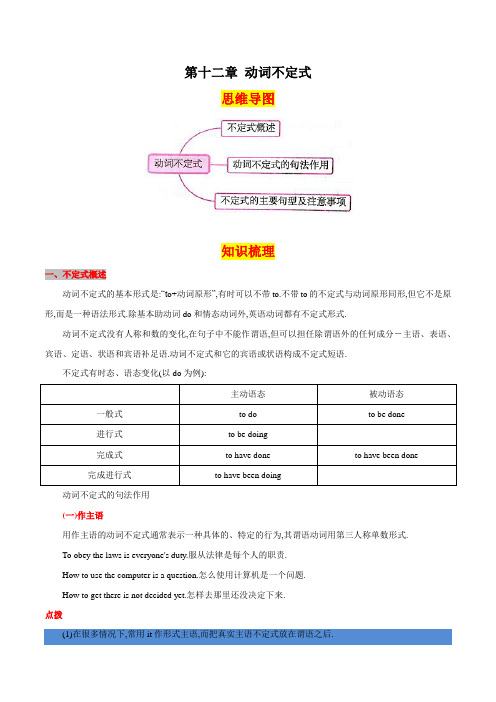
第十二章动词不定式思维导图知识梳理一、不定式概述动词不定式的基本形式是:“t o+动词原形”,有时可以不带to.不带to的不定式与动词原形同形,但它不是原形,而是一种语法形式.除基本助动词do和情态动词外,英语动词都有不定式形式.动词不定式没有人称和数的变化,在句子中不能作谓语,但可以担任除谓语外的任何成分-主语、表语、宾语、定语、状语和宾语补足语.动词不定式和它的宾语或状语构成不定式短语.不定式有时态、语态变化(以do为例):动词不定式的句法作用(一)作主语用作主语的动词不定式通常表示一种具体的、特定的行为,其谓语动词用第三人称单数形式.To obey the laws is everyone's duty.服从法律是每个人的职责.How to use the computer is a question.怎么使用计算机是一个问题.How to get there is not decided yet.怎样去那里还没决定下来.点拨(1)在很多情况下,常用it作形式主语,而把真实主语不定式放在谓语之后.It was difficult to sell my car.我的车很难卖掉.It's not known where to stay for the night.在哪里过夜还不知道.(2)如果要表示不定式的动作是谁做的,一般在不定式前加一个for短语.It will be a regret for us not to help him.我们没有帮助他是个遗憾.(3)在某些形容词(如kind, good, nice, wise, unwise, clever, silly, wrong, right, foolish, stupid, careless, considerate, rude, naughty, impolite等)作表语时,不定式前常可加一个以of引起的短语,来说明不定式指的是谁的情况.It would be rude of us to refuse their invitation.(我们)拒绝他们的邀请,会显得无礼.(二)作表语作表语,一般紧跟在系动词,如:be, seem, get等后面,用以说明主语.The question is when to start.问题是什么时候启程.You seem to have lost weight.你好像减肥了.What we have to do first is to find a solution.我们得做的第一件事是找出一个解决办法.点拨当不定式所作的表语仅用来说明主语的内容时,这个不定式只作单纯的表语,而不具有未来的含义.(三)作宾语能以不定式作宾语的动词很多,常见的有:agree, begin, decide, expect, forget, hope, learn, like, manage, pretend, start, try, want, wish等.Do you wish to see the manager?你想见经理吗?They decided to learn English hard.他们决定好好学英语.Don't forget to meet me at 6:00.别忘了六点钟和我见面.有些动词,如:tell, advise, show, teach, know, forget, learn , remember, show,understand, see, wonder, hear, find out, explain, decide, discuss等后面,常用带疑问词的不定式作宾语.We don't know who(whom)to ask.我们不知道问谁.We asked how to get to the station.我们问怎么到达车站.Have you decided where to go for your holidays?你们决定到哪儿度假了吗?I don't know whether to apply for the job or not?那份工作我不知道申请还是不申请?(四)作定语I have no time to waste.我没有时间可浪费.Let me find a place to park.我来找个停车的地方.He is always the first to come to work and the last to leave.他总是第一个来上班,最后一个走.点拨不定式修饰something, anything, nothing时,放在它们的后面.如果something, anything, nothing 有形容词来修饰,词序是something(nothing...)+形容词+不定式.My father had something to do.我父亲有事要办.Have you got anything important to buy?你有什么重要的东西要买吗?(五)作状语不定式常可用作状语,修饰动词,表示行为的目的、结果、原因等.一般放在被修饰词之后,但在表示目的时,为了强调也可放在句首.1.作目的状语为加强语气在否定式前还可加上in order或so as组成词组(即:in order to...,so as to...),作状语表示目的.To live a long and healthy life, we must learn to have a balanced diet.为了能过长寿而健康的生活,我们必须懂得吃均衡的食品.I stayed there so as to see what would happen.我留在那儿,为的是想看看会发生什么事.In order to help him, we would do everything we can.为了帮助他,我们愿意尽一切力量.2.作结果状语表结果,其逻辑主语通常亦是全句的主语.在“so...as to...”“such...as to..“enough to...”“only to...”以及“too...to...”等结构中的不定式皆表示结果.She is old enough to go to school.她已到了可以上学的年龄了.He was too drunk to drive home.他酩酊大醉,没法开车回家.3.作原因状语She trembled to think of the terrible accident.想到那可怕的车祸,她就不寒而栗.We jumped with joy to hear the news.听到这消息,我们都高兴地跳了起来.(六)宾语补足语1、有很多动词的后面都可以有不定式作宾语补足语常见的这类动词有:advise, ask, tell, help, wish, want, expect, forbid, persuade, press, request, teach, warn等.She asked her grandfather to play game with her.她请爷爷跟她一起做游戏.Mother told me to cook the meal.妈妈叫我做饭.2.有一些动词后用作宾语补足语的不定式通常不带to,这种动词有两类:一类是感觉动词,另一类是使役动词感觉动词:如feel, see, hear, watch, notice等.使役动词:如make, let, have等.Let me do it for you.让我来替你做.Don't let her go out.别让她出去.I made him work hard.我迫使他加劲干.(1)动词help之后,复合宾语中的不定式可带to,亦可不带to.在上述动词转换为被动结构时,其后的不定式必须带to.He was seen to enter the theatre.有人看见他走进了剧院.I was made to do my homework the whole night.我被迫整晚做作业.Can you help me (to) move this table?你能帮我移动一下这张桌子吗?(2)感官动词的宾语补足语有两种形式:不带to的不定式和动词-ing形式.I heard Meimei singing in her room when I went past.我路过的时候听见梅梅在房间里唱歌.(路过的瞬间正在唱,所以用singing)We often hear Meimei sing in her room.我们经常听见梅梅在房间里唱歌.(经常听见,用不定式)I saw him come in.I saw him coming in.两句话的意思都一样:我看见他进来.用不定式着重于动作的全过程,用动词-ing形式则是强调当时动作的进行情况.3.当谓语动词为think, make, find, consider, feel, regard等词,作宾语的不定式后面有宾语补足语时,常用it作形式宾语,而将真正的宾语放在补足语的后面I find it easy to learn English well.我发现要把英语学好很容易.三、不定式的主要句型及注意事项(一)不定式的否定式不定式的否定式:not+不定式,经常和ask(tell)sb. to do sth.句型连用.She asked me not to drive him to the station.她要我不要开车送他到车站.Try not to be late.争取不要迟到.Mary asked me not to give my pen to Jimmy.玛丽让我别把笔给吉米.She decided not to come here again.她决定不再到这儿来.点拨不定式的否定式和否定句的区别:I asked him not to open the door.我让他别把门打开.I didn't ask him to open the door.我没让他把门打开.(二)不定式的进行时态进行式:表示在谓语动词所表示的动作或状态发生时正在进行.It's nice to be sitting here with you.在这儿陪你坐着是非常愉快的.It is unwise for him to be talking that topic all the time.他老是谈论这件事,很不明智.(三)不定式的完成时态完成式表示在谓语动词的动作或状态发生时已经完成.She said she was sorry to have missed you.她说她没见到你很遗憾.He seemed to have visited our factory.他好像参观过我们的工厂.They appeared to have met before.他们看来以前见过面.(四)动词不定式的被动语态表示被动意义I didn't want to be told about it.我不想被告知这件事.Nothing seems to have been forgotten.似乎什么也没有被遗忘.The building is said to have been destroyed in a fire two years ago.据说这幢大楼两年前已毁于一场大火.在以某些形容词,如kind, good, silly, honest, bad, stupid, bold, clever, cruel,courteous, nice, rude, sensible, tactful, wise, wrong等作表语时,后面需用以“of+名词(或代词宾格)+不定式”结构,以说明不定式所表示的动作的执行者是谁(即of短语是不定式的逻辑主语).It's very good of you to come.谢谢你的光临.How silly of you (it is)to make such a mistake!你出了这样的差错,多傻啊!It's very kind of you to say so.多谢你这么说.在had better, had best, would rather, would rather...than, would sooner, would sooner...than, cannot but, do nothing but等结构后面的不定式要省略“to”.You had better write it in English.你最好用英文写.I would rather stay at home.我宁愿待在家里.好题精练一、用-ing形式或不定式的适当形式完成句子1.Do you enjoy_________ football?(play)2.Fred didn't have any money, so he decided_________ a job.(take)3.We're going out for dinner, Would you like_________ us?(join)4.The teacher reminded the students_________ their test paper on time.(finish)5.When I was tired, I enjoyed_________ TV.(watch)6.It was a nice day, so the old man agreed_________ for a walk.(go)7.I'm not in a hurry, I don't mind_________.(wait)答案:1.playing2.to take3.to join4.to finish5.watching6.to go7.waiting二、选择括号内所给词组完成句子,注意括号内“go+v.-ing形式”构成固定搭配的用法(go boating; go fishing; go dancing; go running; go skating; go hunting; go singing)1.She's a good dancer. She always_________ on Saturday.2.I've got a gun. I'll_________ with that strong hunter next weekend.3.“Where is Tim?”“He has. _________ He always runs in the morning.”4.We have enough fish to eat. Our father_________ every day.答案:1.goes dancing2.go hunting3.gone running4.goes fishing三、仿照示例改写下列句子示例:It is very interesting to play baseball.→ To play baseball is very interesting.1.lt was not polite to speak that way before Mr. Lee.____________________________________________________________________________________________ 2.It can be quite easy to travel by air.____________________________________________________________________________________________ 3.lt will be no problem to arrive there before noon.____________________________________________________________________________________________4.To make those strangers believe us was so difficult.____________________________________________________________________________________________ 5.To help Tom speak Chinese well is not at all easy.____________________________________________________________________________________________ 答案:1.To speak that way before Mr. Lee was not polite.2.To travel by air can be quite easy.3.To arrive there before noon will be no problem.4.It was so difficult to make those strangers believe us.5.It is not at all easy to help Tom (to) speak Chinese well.四、选择填空1. _________ the bookstore, he stopped_________ a few books.A. Passing; buyingB. Passing; to buyC. To pass; buyingD. Having passed; to buy2.Bruce,look at your dirty shoes, You'd better_________ them right now.A. washedB. washingC. washD. to wash3. _________ the room, I found the computer_________.A. Entering; stealingB. Entering; stolenC. To enter; stealD. To enter; stealing4.We've worked hard for nearly one hour. Let's stop_________ a rest now.A. haveB. to haveC. havingD. have had5.My mother always tells me not_________ to the net bars(网吧).A. goB. to goC. goesD. going6.The teacher asked us_________ English for half an hour in the morning.A. reads B reading C. to read D. read7.You will have to get up early tomorrow. Stop_________ TV, Peter.A. watchesB. watchC. to watchD. watching8.I find it hard_________ English well.A. learnB. learningC. to learnD. learns9.The teacher asked John_________ a short talk in our class meeting.A. giveB. to giveC. gaveD. giving10.The girl was too poor_________ a houseA. to buy; to live inB. to buy ;to liveC. buy; to liveD. buying; living in11.It was very late at night, but Mr. Brown still went on_________.A. works B .worked C. working D. work12.Remember_________ him about it before he goes away.A. tellB. to tellC. tellingD. to telling13.Lin Tao is strong enough_________ the big box.A. carryB. to carryC. carryingD. carries14.Her mother told her_________ in bed.A. not readB. not to readC. don't readD. to not read15.When class began, we stopped_________ to the teacher carefully.A. listeningB. listenC. listens D .to listen16.You'd better_________ the cinema by bus.A. don't goB. to goC. to go toD. go to17.What did the manager_________ you to_________ at the meeting?A. tell; sayB. ask; speakC. tell; speakD. ask; talk18.Tom was let_________ in the gate house.A. waitB. to waitC. waitingD. to have waited19.Mr.Hu has enough time_________ the job in two days.A. finishB. to finishC. finishingD. finished20.Look,the building_________ is our library.A. is repairedB. being repairedC. repairingD. to be repairing21. _________ no money, I could not buy this coat.A. HaveB. HavingC. To haveD. Have had22.The teacher has something important_________ us.A. to tellB. tellsC. tellingD. told23.Li Ming didn't know_________ next.A. to do whatB. what to doC. how to doD. what do24.I'd love_________ to your birthday party.A. comeB. cameC. to comeD. comes25.It took me two hours_________ by bus.A. to get thereB. to get to thereC. get thereD. get to there答案:1-5BCBBB 6-10CDCBA11-15CBBBD 16-20DABBB21-25 BABCA五、改正下列句子的错误1.He seems to not hear from her.____________________________________________________________________________________________ 2.I hope see you soon.____________________________________________________________________________________________ 3.I made them to give the money back.____________________________________________________________________________________________ 4.The scientist gave us some advice on how learning English.____________________________________________________________________________________________ 5.No one noticed him to leave the room.____________________________________________________________________________________________ 6.Have you given up to smoke?____________________________________________________________________________________________ 7.We found him waited at the school gate.____________________________________________________________________________________________ 8.Why not to turn off the light?____________________________________________________________________________________________ 9.She didn't want me go.____________________________________________________________________________________________ 10.I don't know to swim.____________________________________________________________________________________________ 11.China is a developed country belonging to the third world.____________________________________________________________________________________________ 12.It's getting dark. We have to find a hotel to live.____________________________________________________________________________________________ 13.He said he had an important meeting to attended.____________________________________________________________________________________________ 14.They don't allow that people smoke.____________________________________________________________________________________________ 15.It's difficult sell my car.____________________________________________________________________________________________ 答案:1.He seems not to...2.I hope to see...3.I made them give...4....how to learn...5....him leave...6....given up smoking?7...him waiting...8.Why not turn off...9.She didn't want me to go.10.I don't know how to swim.11....a developing...12....to live in13....to attend.14. ...people to smoke.15...to sell my car.。
语法知识点梳理动词不定式的用法

语法知识点梳理动词不定式的用法动词不定式是英语语法中的一项重要知识点。
它是由动词原形加上"to"构成,常用作名词、形容词或副词的补充。
本文将对动词不定式的用法进行梳理,帮助读者更好地理解和运用。
一、动词不定式作主语动词不定式可以作为句子的主语。
例如:1. To learn a foreign language is beneficial to one's personal development.学习一门外语对个人发展有益。
2. To exercise regularly is important for maintaining good health.定期锻炼对保持健康很重要。
二、动词不定式作宾语1. 表示建议或命令动词不定式常用于表示建议、命令或请求的动词后。
例如:1. He advised me to take a vacation.他建议我去度假。
2. The teacher told the students to be quiet.老师告诉学生们安静。
2. 表示喜好或感知某些动词后面跟动词不定式,用来表示喜好、感知、感觉等。
例如:1. I enjoy playing the piano in my free time.我喜欢在闲暇时弹钢琴。
2. She saw him enter the room quietly.她看到他悄悄地进了房间。
三、动词不定式作宾语补足语某些动词需要与动词不定式连用,形成宾语补足语,用来补充说明或补充宾语的意义。
例如:1. I found it difficult to solve the math problem.我发现解决这个数学问题很困难。
2. He considers her to be the best candidate for the job.他认为她是这份工作的最佳候选人。
四、动词不定式作定语动词不定式可以用作名词的前置定语,用来修饰名词。
初二英语之动词不定式的用法

初二英语知识总结动词不定式:to+动词原形不能做谓语。
一做主语To learn English is important for me .It is important for me to learn English.It is kind of you to help me .It takes me half an hour to walk to school every day.It’s good for us _______ (exercise) more .二做宾语I hope to have much money .She planned to stay at home .可以加动词不定式的词有:want , afford(卖得起,支付得起) ,fail (失败) ,decide, hope , expect, would like , happen(碰巧),wish(祝愿,希望)help,try , forget , remember, like , start, begin, stop,like 等try to do sth 努力/尽力做某事try doing sth 试着做……forget to do sth 忘记做某事(事情没做)forget doing sth 忘记曾经做过什么(事情已经做了)Don’t forget to bring your homework to school .I forgot seeing him somewhere.remember to do sth 记得做某事remember doing sth 记得做过什么I must remember to give you back the money.I remembered giving you that money .stop to do sth 停下(正在做的一件事)去做另一件事stop doing sth 停止做什么Let’s stop to have a rest .When my mother came in , I stopped writing.Stop________ (talk) , I want to tell you a thing.疑问词+动词不定式做宾语I don’t know what to say .She wants to know how to go .三做宾语补足语The teacher told us to stand there quietly.She asked me to go shopping with her.常用的词组:want sb to do sth , would like sb to do sth ,teach sb to do sth , tell sb (not) to do sth, help sb (to) do sth.make/ have /let sb do sth , see/watch/listen to/hear/find/feel sb do sth (动词不定式符号to省略了)see/watch/listen to/hear/find/feel sb doing sth (强调动作正在进行)I saw a dog run into a house .I see them playing basketball there .四做定语Watching sitcoms is a great way to relax.Would you like something to drink?I have no time to wait for you.Beijing is a good place ______ (visit) .五做状语She followed me to see what happened next.He always tells us jokes to make us laugh.I am sorry to trouble you .六做表语Her job is to sell shoes .My dream is to be a scientist .It seems to rain.He seemed to know everything .习题:1 Do you want ________ (join) us ?2 She hopes ________ (see) you soon.3 Would you like _______ (have) a cup of tea ?4 I enjoyed __________ (watch) game shows .5 Don’t stop ______ (run) , you are the first .6 Don’t forget ______ (bring) me your photos .7 The man told me ________ (not play) on the road .8 She taught them ______ (dance) the swing dance.9 What about ___________ (go) shopping with me?10 I can’t stop ________ (laugh). 11 Could you help me ________ (pick) it up?12 The story made us ______ (cry) .13 I often hear her _____ (sing) in her room.14 He seems _____ (become) athletic.15 Her wish is _______ (buy) a car. 16 I went there _____ (visit) her.17 Thanks for _______ (give) me so much .18 She always tries his best _____ (learn) much.19 If you try _____ (study) hard , you’ll get good grades.20 I am sorry ____ (hear) that. 21 I don’t know which one ________ (choose ) .22 She practices _______ (speak) English every day.23 My father decided _______ (buy) a computer for me .24 Don’t expect ________ (learn) anything from it .25 Do you plan _____ (stay) with her ?26 I found it difficult _______ (make) friends with others .27 Would you like me _______ (tell) you the truth ?28 Could I ______ (borrow) a book from you ?29 It took me two hours ______ (draw) the picture.30 She is good at ________ (sing)友情提示:范文可能无法思考和涵盖全面,供参考!最好找专业人士起草或审核后使用,感谢您的下载!。
八年级英语动词不定式用法梳理
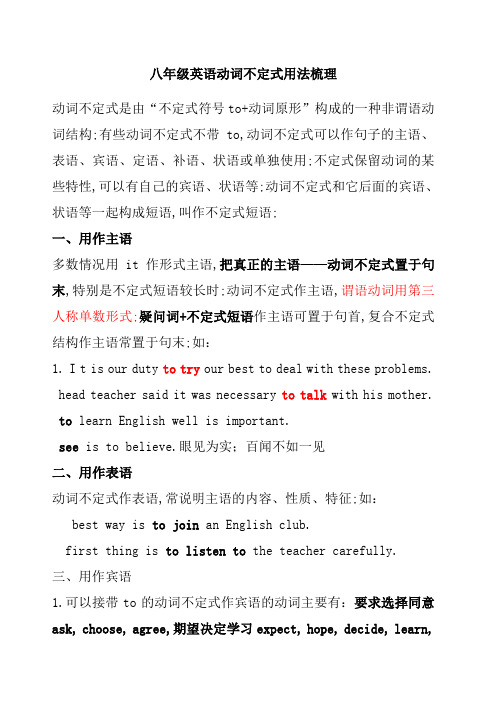
八年级英语动词不定式用法梳理动词不定式是由“不定式符号to+动词原形”构成的一种非谓语动词结构;有些动词不定式不带to,动词不定式可以作句子的主语、表语、宾语、定语、补语、状语或单独使用;不定式保留动词的某些特性,可以有自己的宾语、状语等;动词不定式和它后面的宾语、状语等一起构成短语,叫作不定式短语;一、用作主语多数情况用it作形式主语,把真正的主语——动词不定式置于句末,特别是不定式短语较长时;动词不定式作主语,谓语动词用第三人称单数形式;疑问词+不定式短语作主语可置于句首,复合不定式结构作主语常置于句末;如:1. I t is our duty to try our best to deal with these problems. head teacher said it was necessary to talk with his mother. to learn English well is important.see is to believe.眼见为实;百闻不如一见二、用作表语动词不定式作表语,常说明主语的内容、性质、特征;如: best way is to join an English club.first thing is to listen to the teacher carefully.三、用作宾语1.可以接带to的动词不定式作宾语的动词主要有:要求选择同意ask, choose, agree,期望决定学习expect, hope, decide, learn,宁可假装知道prefer, pretend, know,希望想要愿意wish, want, would like / love;如:1We decided to talk to some students about why they go there. 2He prefers to eat white bread and rice.3Id love to visit Mexico.2.动词decide, know, learn, show, teach, tell...,介词结构on...可用疑问词带to的不定式短语作宾语,但why后面的不定式不带to;如:1Could you please tell me where to park my car2It gives advice on what to do in lots of different situations.3.动词feel, find, make, think等后面,可以用it作形式宾语代替真正的宾语——动词不定式,句子结构是...feel / find / make / ... it+adj. / n.+to do...;如:4. 感知动词like, love, know等一般不用进行时态;5.后接动词不定式或ving形式作宾语,意思差别较大的动词有forget, remember等;后接不定式作宾语,表动作尚未发生;后接ving形式作宾语,表动作已经发生;stop to do停下来做另外一件事,to do是目的状语;stop doing停止做、不做当前这件事,doing 是宾语;try to do尽力做,try doing试试看;go on to do接着做另外的事,go on doing继续做原来的事;如:1When I left home, I forgot to bring it with me.2I stopped using them last year.四、用作定语1.句子的主语或宾语是动词不定式的逻辑主语,不定式与其所修饰的名词、代词等存在逻辑的动宾关系.1I have so many clothes to wash today.2I can’t think of any good advice to give her.3We have no houses to live in.2.动词不定式所修饰的名词是place, time, way等时,不定式与这些名词呈现出动状关系或同位关系;如:1He needs time to do homework.2 He wants to know the best way to travel around the city.3.在“there be...”句型里,句子的主语是动词不定式动作的对象:1There’s just so much to see and do here.2... but there are still many things to do the五、用作宾语补足语1.带to的动词不定式作宾语补足语的动词主要有:要求允许提议ask, allow, , advise,期望邀请鼓励expect, , invite, encourage,教导告诉想要teach, tell, want,等待希望愿意wait for, wish, would like / love;如:1Id invite her to have dinner at my house.2 We should allow the children to choose their own clothes.2.动词不定式作补语,在主动语态句里不带to,被动语态句里带to时多数动词是感官动词和使役动词,包括四“看”:look at, observe, see, watch,三“让”:have, let, make,二“听”:hear, listen to,一“感觉”:feel,一“注意”:notice;如:1This picture makes me feel excited2We saw Liu Yu play baseball last week.后接动词不定式作补语,to可带可不带;1 they can help you to learn English.2Using email English helps you write quickly.六、用作状语1.目的状语,置于句首或句末,置于句首时常表示强调;如:1In order to catch the early bus, she got up very early.2A group of young people got together to discuss this question.3She came to this city to visit her daughter.2.原因状语,多见于“sb.+be+adj.+to do...”结构句中;如:1 I feel very lucky to have him.2 he ran out of money to buy old bikes.3.结果状语,多见于“too...to”,“enough to...”结构句中;如:1 I’m too tired to do it well.2The room is big enough for three people to live in.七、动词不定式的复合结构动词不定式的复合结构是“for / of sb. to do sth.”,for / of引出不定式动作的逻辑主语;这种结构在句子中可以作主语、宾语、表语、定语、状语等;不定式复合结构的介词用for还是of,主要决定于前面形容词的性质;一般说来,of前面的形容词是careful, clever, foolish, good, kind, nice, wise等,既说明人的特性,又说明不定式动作的特性;for前面的形容词是dangerous, difficult, easy, hard, heavy, important, interesting, necessary等,一般说明不定式动作的特性,前面如果是名词用for;如:’s a good idea for parents to allow children to study in groups during the evening.’s wise of him to do it well.3Is it interesting for the baby to play with a pet dog 八、带疑问词的不定式短语动词不定式前面可以带疑问代词what, which, who或疑问副词how, when, where, why等;这种结构起名词的作用,在句子里用作宾语、主语、表语等,或者单独使用;要注意的是,why后面的不定式不带to;如:1.用作句子的成分;1I don’t know what to try next. 作宾语2Where to go is not decided yet.作主语2.单独使用时相当于一个特殊疑问句;1What to do next=What will we / you do next2Why go there=Why do we / you go there九、动词不定式的否定式不定式的否定式是not / never to do...,不带to的不定式的否定式是not / never do...如:decide not to talk to each other.parents tell him never to play soccer in the street.随堂练习一动词填空;’m going to l isten to the radio. Please ____not talkany more. 2. The students ____dotheir homework from four to five this afternoon.3. The students ____bebusy now. They ____havean English exam next Monday.4. Mary must ____lookafter her little sister because she is too young.5. ____heyou waiting for a bus now6. This coat is very cheap. I ____takeit now.7. I’ll tell him about it when he ____comeback.8. Could you tell me ____can getto No 3 Middle school.9. He ____ said that the new teacher ____givethe students an English lesson now.10. I ____milka cow three times.11. Edison’s mother ____teachhim herself.12. He ____watchTV once a week.13. Don’t speak loudly. The baby ____sleep.14. I won’t go out ____finishmy homework.15. Could you tell me when the train ____arrive.16. I often hear the sound of children ____readEnglish in the room.asked me ____helphim with his English this evening.18. Their work is ____cleanthe streets.19. Did he enjoy ____workin China.20. We will stay at home if it _____raintomorrow.21. Be quiet The boy ____singan English song.22. _____ you _____ your homework yetstart23. Who ____teachthem English last term.24. There _____bea telephone call for you just now.25. Please keep everything ____clean.26. Peter won’t have a rest until he ____finishhis work.27. I watched TV, so I ____forget_____domy homework.28. When I ____walkalong the river ,I met my friend,Tom.29. When Mother came ,the little girl ____playwith a cat.30. When I was five,I _ __ _getto know the earth ____movearound the sun.31. They _____seea boy _____fallinto the river while they ____passit yesterday.32. _____studyhard at your lessons andnot talkin class.33. You _____havebetter _____not eatthe bad food.34. While I ___do my homework,my parents __watchTV.35. He ____ not finish____readthe book.36. I ____getup very early this morning. I ____readEnglish now.37. He ____hurryto school every morning.38. Our teacher ____not stop____workuntil eleven o’clock last night.39. If he ____knowit ,he ____bevery happy.40. It ____takeus half an hour ____readEnglish every day.41. The children ____runin the street now.42. There ____betwo meetings tomorrow morning.43. My father ____sleepwhen I ____getup this morning.44. When I ____goto see Tom, he ____not writeanything.45. Sorry, when you ____callme, I ____thinkand ____not hearyou.46. Mr. Green ____leavehis notebook at home yesterday.47. I ____wantto buy a new coat next Sunday.48. His father ____readnewspaper when I got there.49. It ____befive years since he ____buythe motorbike.50. We found it was very difficult ____geta car.are so glad ________ hear the news.saw him ________ cross the road safely and ________ run away. can’t make him ________ do what you want.don’t know where ________ meet him.makes you ________ think I’m a farmeryou see him ________ go upstairsis better ________ put your money in a bank.is difficult for the boy ________ swim across the river.let him ________ go early as he wanted ________ meet his uncle at the station.you help me ________ move the bedhe doesn’t know, how ________ use the recorder, you’d better ________ show him.is the last one ________ leave the office every day.’s bad manners ________ shout in public.boy is old enough ________ dress himself.is too ill ________ go to school.二选择题1. Tell him ___ the window.A. to close notB. not to closeC. to not closeD. not close2. Paul doesn't have to be made ___. He always works hard.A. learnB. to learnC. learnedD. learning3. You'd better _______the story in Japanese.A. sayB. speakC. tellD. talk4. The patient was warned ___ oily food after the operation.A. to eat notB. eating notC. not to eatD. not eating5. ---- I usually go there by train.---- Why not ___ by boat for a changeA. to try goingB. trying to goC. to try and goD. try going6. There are some books on the floor, would you like ________A. to pick them upB. to pick up themC. pick it upD. pick up it7. She is very ill, let's _______a doctor at once.A. to wake upB. send forC. to pay forD. pay for8. I want ________a teacher when I grow up.A. to beB. toC. beD. being9. It's cold here. You'd better ______ your coat.A. not take outB. not to take downC. not take offD. not to take away10. My mother told me ________more water.A. drinkingB. drankC. to drinkD. drink。
UC头条:八年级上册英语语法:最全动词不定式的用法详解
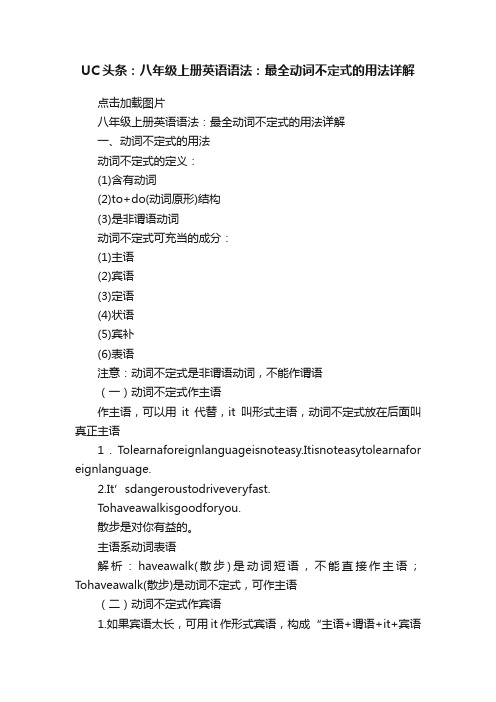
UC头条:八年级上册英语语法:最全动词不定式的用法详解点击加载图片八年级上册英语语法:最全动词不定式的用法详解一、动词不定式的用法动词不定式的定义:(1)含有动词(2)to+do(动词原形)结构(3)是非谓语动词动词不定式可充当的成分:(1)主语(2)宾语(3)定语(4)状语(5)宾补(6)表语注意:动词不定式是非谓语动词,不能作谓语(一)动词不定式作主语作主语,可以用it代替,it叫形式主语,动词不定式放在后面叫真正主语1.Tolearnaforeignlanguageisnoteasy.Itisnoteasytolearnafor eignlanguage.2.It’sdangeroustodriveveryfast.Tohaveawalkisgoodforyou.散步是对你有益的。
主语系动词表语解析:haveawalk(散步)是动词短语,不能直接作主语;Tohaveawalk(散步)是动词不定式,可作主语(二)动词不定式作宾语1.如果宾语太长,可用it作形式宾语,构成“主语+谓语+it+宾语补足语(名词或形容词)+todosth”结构,谓语动词常为find、think、feel等。
Ithinkit'stooeasytosolvethisproblem.我认为解决这个问题太简单了。
Ifounditdifficulttostophim.我发现拦截他很困难。
Iwanttohaveawalk.(我)〈想要〉{去散步}。
(主语)〈谓词〉{宾语}解析:动词不定式tohaveawalk(去散步)是want(想要)的内容,作want(想要)的宾语2.常可接动词不定式作宾语的动词有:agree同意/hope希望/decide决定/need需要/mean打算/wish希望/fail(失败)/want想要/begin开始/wouldlike想要/Ask请求/beg乞求/leave离开/like/love喜欢/hate(讨厌)/prefer宁愿/order命令/teach教/tell/告诉/believe相信/find/找出/know/知道/want/想要/think认为/understand明白,理解,懂得3.后面跟动词不定式的动词口诀有:1)三个希望两答应wishhopewantpromisagree2)两个要求莫拒绝askbegrefuse3)想要明白与知道wouldlikeunderstandknow4)教会告诉要相信teachtellbelieve5)找出爱恨区别点findlovehateHehasdecidedtogotothecountryside.他已决心去乡下。
初二不定式知识点归纳总结
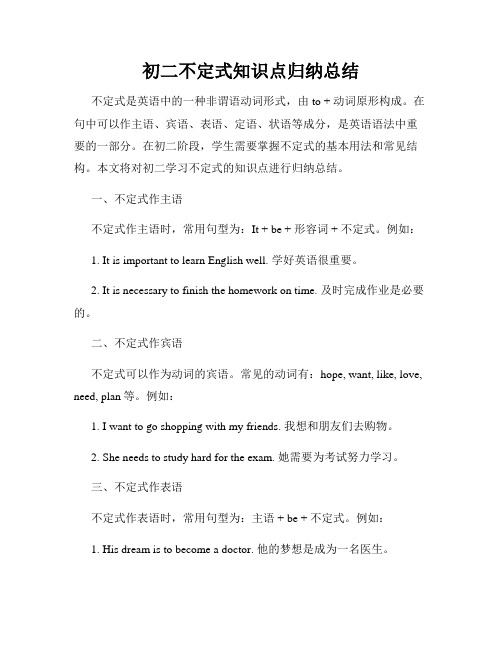
初二不定式知识点归纳总结不定式是英语中的一种非谓语动词形式,由to + 动词原形构成。
在句中可以作主语、宾语、表语、定语、状语等成分,是英语语法中重要的一部分。
在初二阶段,学生需要掌握不定式的基本用法和常见结构。
本文将对初二学习不定式的知识点进行归纳总结。
一、不定式作主语不定式作主语时,常用句型为:It + be + 形容词 + 不定式。
例如:1. It is important to learn English well. 学好英语很重要。
2. It is necessary to finish the homework on time. 及时完成作业是必要的。
二、不定式作宾语不定式可以作为动词的宾语。
常见的动词有:hope, want, like, love, need, plan等。
例如:1. I want to go shopping with my friends. 我想和朋友们去购物。
2. She needs to study hard for the exam. 她需要为考试努力学习。
三、不定式作表语不定式作表语时,常用句型为:主语 + be + 不定式。
例如:1. His dream is to become a doctor. 他的梦想是成为一名医生。
2. The goal of our project is to promote environmental protection. 我们项目的目标是促进环境保护。
四、不定式作定语不定式可以修饰名词或代词,起到定语的作用。
例如:1. I have a lot of books to read. 我有很多书要读。
2. She is a girl to trust. 她是一个值得信任的女孩。
五、不定式作状语不定式可以作为动词的状语,表示目的、结果、原因等。
例如:1. She went to the library to borrow some books. 她去图书馆借书。
史上最完整的动词不定式用法规律知识点总结
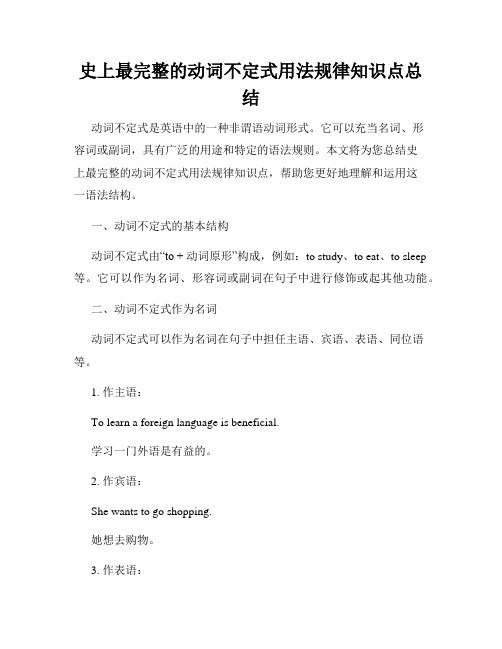
史上最完整的动词不定式用法规律知识点总结动词不定式是英语中的一种非谓语动词形式。
它可以充当名词、形容词或副词,具有广泛的用途和特定的语法规则。
本文将为您总结史上最完整的动词不定式用法规律知识点,帮助您更好地理解和运用这一语法结构。
一、动词不定式的基本结构动词不定式由“to + 动词原形”构成,例如:to study、to eat、to sleep 等。
它可以作为名词、形容词或副词在句子中进行修饰或起其他功能。
二、动词不定式作为名词动词不定式可以作为名词在句子中担任主语、宾语、表语、同位语等。
1. 作主语:To learn a foreign language is beneficial.学习一门外语是有益的。
2. 作宾语:She wants to go shopping.她想去购物。
3. 作表语:His dream is to become a doctor.他的梦想是成为一名医生。
4. 作同位语:His goal, to win the championship, motivates him to practice every day.为了赢得冠军,他每天都在努力。
三、动词不定式作为形容词动词不定式可以作为形容词修饰名词,通常在名词之前。
1. 修饰名词:I have a book to read.我有一本要读的书。
2. 修饰人:She is the person to ask for help.她是可以求助的人。
四、动词不定式作为副词动词不定式可以作为副词修饰动词、形容词或副词,表示目的、结果、原因等。
1. 修饰动词:He bought a new computer to play games.他买了一台新电脑来玩游戏。
2. 修饰形容词:She is too tired to continue working.她太累了,无法继续工作。
3. 修饰副词:He speaks English fluently enough to communicate with foreigners.他的英语说得足够流利,可以与外国人交流。
初中动词不定式用法归纳

1)Could you please tell me where to park my car? 2)It gives advice on what to do in lots of different situations. 3)We have decided where to go. 4)I don’t know what to do.
3.动词feel, find, make, think等后面,可以用it 作形式宾语代替真正的宾语——to do,句子结 构是:主+feel / find / make / + it+adj. / n.+to do...。如: 1)I find it difficult to remember everything. 2)He thinks it important to be honest.
6.后接动词不定式或ving形式作宾语,意思差别较 大的动词有forget, remember等。后接不定式作 宾语,表动作尚未发生;后接ving形式作宾语, 表动作已经发生。stop to do停下来做另外一件事, to do是目的状语;stop doing停止做、不做当前 这件事,doing是宾语。try to do尽力做,try doing试试看;go on to do接着做另外的事,go on doing继续做原来的事。如:
2. The boy wanted to ride his bicycle in the
street, but his mother told him __A____.
动词不定式的用法总结

动词不定式的用法总结动词不定式是英语中一种常见的非谓语动词形式,由动词原形加上“to”构成。
它具有多种用法和功能,在句子中可以扮演多种角色。
下面将对动词不定式的用法进行总结和分析。
一、作主语动词不定式可以作为句子的主语,通常位于句首,帮助构成句子的基本结构。
例如:- To learn is to grow. - To study is important for success.二、作宾语动词不定式可以作为动词的宾语,跟在及物动词之后。
例如:- She wants to dance all night. - They decided to go on a trip.三、作介词宾语动词不定式还可以作为介词的宾语,通常介词后面要跟动词的-ing形式,但在某些情况下,使用动词不定式更为恰当。
例如:- She is afraid to speak in public. (介词“in”后接动词不定式) - He is capable of solving difficult problems. (介词“of”后接动词不定式)四、作定语动词不定式可以作为名词的定语,修饰名词。
例如:- I have some books to read. - This is a place to visit.五、作表语动词不定式有时也可以作为句子的表语,描述主语的身份或状态。
例如:- His goal is to become a doctor. - The key is to be patient.六、作宾补动词不定式可以作为宾语的补语,表示对宾语的补充说明。
例如:- She considers him to be her best friend. - They found the task to be challenging.七、作状语动词不定式还可以作为状语,修饰动词或整个句子,表示目的、原因、结果等。
例如:- She works hard to achieve her goals. (目的) - He left early to catch the train. (目的) - He stayed up late to finish his project. (目的) - He left the room, only to return a few moments later. (结果)动词不定式的用法多样灵活,在句子中起着重要的作用。
初二英语知识点归纳动词不定式

初二英语知识点归纳:动词不定式初二英语知识点归纳:动词不定式1.不定式的基本形式与结构动词不定式指通常由to加上动词原形(如to write) 所构成的一种非限定性动词形式,但在有些情况下to 可以省略。
动词不定式有进行体和完成体(如上to be writing,to have written),也有被动态(如to be written),所有的主动词,不论是及物动词还是不及物动词,也不论是动作动词还是状态动词,都有不定式形式。
助动词除be和have外,没有不定式形式。
动词不定式在语法功能上可作主语、宾语、表语、定语和状语。
2.不定式的用法 1)不定式结构作主语 1.Te get contact with his family in Taiwan made him extremely happy since they separated more than 40 years ago. 2.To finish that task in such a short time is really a challenge. 在上述情况下,如果不定式较长,显得头重脚轻,则可由代词让作形式主语(形式主语it不可由that或this 等其他代词代替),而将不定式放到后面。
如: 1.It made him extremely happy to get contact with his family in Taiwan since they separated more than 40 years ago. 2.John admitted that it is always difficult for him to be on time. 不定式结构所表示的动作是谁做的,即不定式的逻辑主语,通常可以通过for sb. to do sth. 结构表达: 1.It is quite important for us to read good books during a general review. 2.It is not difficult fot those talented students to pass the exam. 在某些形容词(如careless,clever,considerate,foolish,good,impolite,kind, naughty,nice,silly,stupid等)作表语时,不定式后可以加of来引导出其逻辑主语: 1.It is very kind of you to tell me the truth. 2.It is stupid of him to do such a silly thing. 2)不定式作宾语不定式作宾语有两种:一种是及物动词后直接跟带to的不定式,另一种是“及物动词+疑问词+带to的不定式。
初二英语动词不定式用法小结及练习

初二英语动词不定式用法小结动词不定式是动词的一种特殊形式,它没有人称和数的变化,在句子中不能做谓语;它由“to+动词原形”构成,其否定形式是“notto+动词原形”.在句子中可作主语、表语、宾语、宾语补足语、定语和状语等句子成分。
为使同学们更好地掌握其用法,现总结如下:一、动词不定式作主语动词不定式作主语,例如To think of the animals in danger is sad .为避免句子的头重脚轻,常用it作为形式主语,而真正的主语动词不定式后置,如It is sad to think of the animals in danger .常用句型:It +be+adj./n to do sth./It takes sb. some time to do sth.二、动词不定式作宾语一些动词,如want, decide, hope, ask, agree, choose, learn, plan, need, teach, prepare,等,常接动词不定式作宾语。
应注意有些动词后面可接不定式作宾语,也可接动名词作宾语,但所表达的意义不同。
常见的有:(1)stop to do sth.停下来去做另一件事;stop doing sth. .停止正在做的事(2)try to do sth.尽力做某事;try doing sth.尝试做某事(3)remember/forget to do sth.记住/忘记去做某事;remember/forget doing sth.记得/忘记做过某事。
下列动词(enjoy finish keep mind practice spend advise suggest allow)后面不能用不定式,用动名词作宾语三、动词不定式作宾语补足语有些动词,如tell, ask, want, invite, teach, like, call等可接带to的动词不定式作宾语补足语,构成tell/ask/want /call/invite sb. to do sth.结构。
八年级英语动词不定式复习

动词不定式复习语法复习:动词不定式动词不定式(to do)是初中英语课的一个重点,也是中考要考查的一个项目.动词不定式属于非谓语动词的一种形式,很多同学经常把它和谓语动词混在一起,掌握起来有困难。
下面我们对动词不定式的用法做简单归纳,帮助同学们记忆:一、动词不定式在句子中不能充当谓语,没有人称和数的变化。
二、动词不定式是由“to+动词原形”构成(有时可以不带to).动词不定式的否定形式是“not+动词不定式"(not不与助动词连用).三、动词不定式短语具有名词、形容词和副词等的功能,可在句中用做多种句子成分。
1、主语:常置于句末,而用it代替其做形式主语。
To go in for sports helps you stay fit.It is dangerous to swim in the deep sea on your own.注:此句式中不定式逻辑上的主语可由for或of引出,逻辑主语由of引出时,表语的形容词为kind,nice, good, polite, clever, foolish,right, wrong等表示评价的形容词.例:It’s right of him to refuse the invitation。
(him为逻辑主语)2、表语:Our duty is to protect the environment。
3、动词宾语:此种情况可按固定搭配或句式去记。
例:Would you like to see my photos?Kevin planned to visit his uncle。
和plan用法一样的词还有:start, want,agree,hope, begin,decide等。
I found it very difficult to get a job。
(it为形式宾语)4、宾语补足语:(1) 在多数复合宾语及物动词后要带to。
例:I asked a friend to read it to me. (book4,L2)(2)在表示感觉、致使等意义的动词(see,watch, hear, feel,notice, observe,make,let,have, help等) 后不带to。
动词不定式的基本用法归纳

不定式用在介词but, except, besides 后时,如果这些介词前有行为动词do的 各种形式,那么介词后的不定式不带to, 相反则带to. (1). She could do nothing but cry. (2). I have no choice but to go.
5.定语
1、不定式与被修饰的名词往往构成逻辑上的关系。 如名词为不定式的逻辑主语,构成主谓关系; 若名 词为逻辑宾语,则构成动宾关系; He is not a man to tell lies. There will not be enough space to stand in on the earth 未来地球上甚至没有多余的空间让人去站立 。 2、作定语的不定式与所修饰的名词之间是动宾关系, 不定式动词又是不及物动词时,应在该动词上加上 一个介词,如; He has a nice pen to write with. He is looking for a room to live in. (live ) He is said the best way to travel by is on foot.
1. 作定语的不定式如果是不及物动词,或者不 定式所修饰的名词或代词是不定式动作的地点、 工具等,不定式后面须有相应的介词。 He is looking for a room to live in. 2. 不定式所修饰的名词如果是time, place或way, 不定式后面的介词习惯上要省去。 He had no money and no place to live in.
动作一直在进行而且可能之后也继续)
1. 作主语 2. 作宾语 3. 作表语 4. 作宾语补足语 5. 作定语 6. 作状语 7. 作独立成分 8. 与疑问词等连用
八年级上专题复习—动词不定式

动词不定式及重点短语和句型一、常使用动词不定式的短语表1).带"to" 的有1..can’t wait to do sth.迫不及待要做某事2. need to do sth 需要去做某事(注意与need当情态动词用时的区别)3.agree to do sth/with Sb/Sth 同意干/某人/某事4.ask (tell ) sb. (not ) to do sth. 要求/告诉某人(不)做某事5.allow sb. to do sth. 允许某人做某事6.Would like /want (sb.) to do sth. 想要做某事7.Have sth/nothing to do 有…时要做/与…无关8.find it+adj+ to do sth. 发觉做某事…9.Prefer to do sth. rather than do sth.=prefer +V-ing ..to + V -ing 宁愿做某事, 而不愿做某事10.It’s time to do sth.\ It’s time for sth该做某事的时候了11.It’s +adj. for sb. to do sth.12.It’s +adj. of sb. to do sth.做某事对某人来说是…(假如Sb be adj 通顺就用of )13.It’s better /best to do sth.最好做某事14.It takes sb some time to do sth. 某人花时间做某事ed to do sth. 过去常常干....16.do /try one 's best to do Sth 尽力干某事17.change one 's mind to do S th 改变某人的主意干...18.be afraid /terrfied to + V 害怕...干...19.be proud/ the pride to +v=take pride in +V -ing 以...而骄傲/自豪20.be excited to + V /about + n /Pron 对干.、、、感到兴奋21.be surprised to +V /with +n /pron 对干...感到惊奇2).注意以下句型的互换:1. too…to do st h. 太…而不能…2. so +adj. /adv + that(从句) 如此…以致…3.such +(a/an +adj.)+n.+ that(从句) 如此…以致…4.(not) enough (for sb.) to do sth. (对某人来说)做某事(不)够Eg A. The boy is too young to go to school.B. The boy is so young that he can’t go to scho ol.C. He is such a young boy that he can’t go to school.D. The boy is not old enough to go to school. 他太年轻而不能去上学.另外对比介词一起记忆,以下不同的是+名词/代词.1.say "hello to Sb "/"Goodbye " to Sb 向...问好/说再见2.take ... to .... 把..拿...地方去3.bring .... to 把..从..地方带来4.show ..Sth to S b 把...给..看5.send ..Sth to Sw .发射...到/派遣... 去....6.get/be married to+ Sb 与结婚7.lend Sth to Sb 把....借给.... (borrow ..S th .. from Sb从....借进.... )假如把两个宾语位置对调,则上省略"to " 。
初中八年级英语不定式归纳总结

初中⼋年级英语不定式归纳总结 英语做为⼀门语⾔学科,不管是初中还是⾼中都需要脚踏实地,坚持不懈学习。
以下是店铺分享给⼤家的初中⼋年级英语不定式归纳,希望可以帮到你! 初中⼋年级英语不定式归纳 1.作主语。
如: To learn English is very important. 但实际上不定式作主语常⽤ it来作形式主语,⽽将不定式移⾄谓语动词后作真正的主语。
如上句可表达为: It's very important to learn English. 2.作表语。
如: My idea is to ring him up at once. 3.作宾语。
如: I have decided to go to Binjiang Primary School. 4.作宾语补⾜语。
a. ask, want, teach, tell, know, would like, allow等动词后⾯接动词不定式作宾语补⾜语。
如: The policemen asked him to get off the bus. b. hear, see, look at, feel, watch, notice, listen to等动词后接不带to的动词不定式作宾语补⾜语。
如: We often see Miss Li clean the classroom. c. let, make, have这些使役动词后接不带to的动词不定式作宾语补⾜语。
但在被动语态中这些不带to 的都须带上to。
如: In those days the bosses often made the workers work day and night. d.动词help接动词不定式作宾语补⾜语,可带to也可不带to。
如: Can you help me (to) carry the heavy bag? 5.作定语。
a.与被修饰词有动宾关系。
八上动词不定式用法
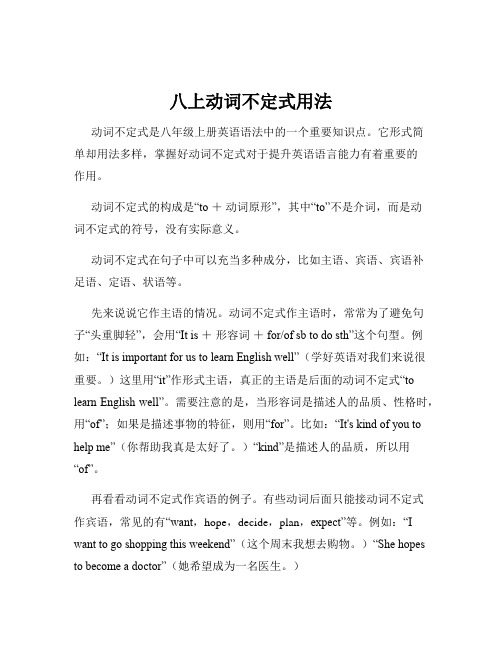
八上动词不定式用法动词不定式是八年级上册英语语法中的一个重要知识点。
它形式简单却用法多样,掌握好动词不定式对于提升英语语言能力有着重要的作用。
动词不定式的构成是“to +动词原形”,其中“to”不是介词,而是动词不定式的符号,没有实际意义。
动词不定式在句子中可以充当多种成分,比如主语、宾语、宾语补足语、定语、状语等。
先来说说它作主语的情况。
动词不定式作主语时,常常为了避免句子“头重脚轻”,会用“It is +形容词+for/of sb to do sth”这个句型。
例如:“It is important for us to learn English well”(学好英语对我们来说很重要。
)这里用“it”作形式主语,真正的主语是后面的动词不定式“to learn English well”。
需要注意的是,当形容词是描述人的品质、性格时,用“of”;如果是描述事物的特征,则用“for”。
比如:“It's kind of you to help me”(你帮助我真是太好了。
)“kind”是描述人的品质,所以用“of”。
再看看动词不定式作宾语的例子。
有些动词后面只能接动词不定式作宾语,常见的有“want,hope,decide,plan,expect”等。
例如:“I want to go shopping this weekend”(这个周末我想去购物。
)“She hopes to become a doctor”(她希望成为一名医生。
)接着是动词不定式作宾语补足语。
常见的动词有“ask,tell,want,allow,encourage”等。
比如:“My mother asks me to clean my room every day”(我妈妈每天叫我打扫房间。
)“The teacher encourages us to study hard”(老师鼓励我们努力学习。
)动词不定式作定语时,通常放在被修饰词的后面。
八年级上册英语动词不定式用法
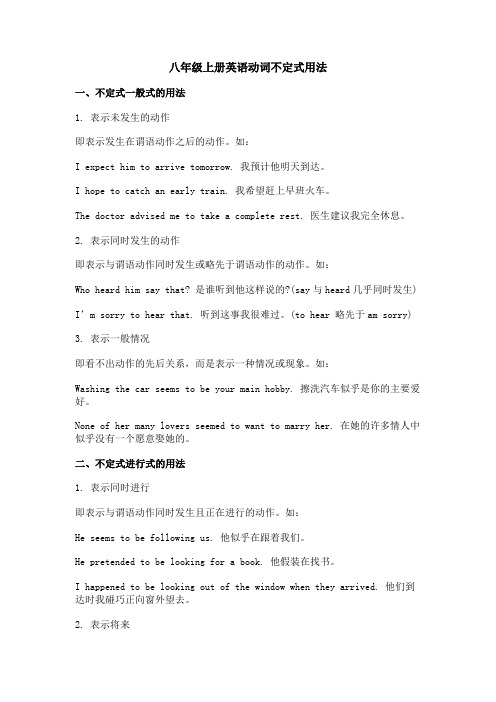
八年级上册英语动词不定式用法一、不定式一般式的用法1. 表示未发生的动作即表示发生在谓语动作之后的动作。
如:I expect him to arrive tomorrow. 我预计他明天到达。
I hope to catch an early train. 我希望赶上早班火车。
The doctor advised me to take a complete rest. 医生建议我完全休息。
2. 表示同时发生的动作即表示与谓语动作同时发生或略先于谓语动作的动作。
如:Who heard him say that? 是谁听到他这样说的?(say与heard几乎同时发生)I’m sorry to hear that. 听到这事我很难过。
(to hear 略先于am sorry)3. 表示一般情况即看不出动作的先后关系,而是表示一种情况或现象。
如:Washing the car seems to be your main hobby. 擦洗汽车似乎是你的主要爱好。
None of her many lovers seemed to want to marry her. 在她的许多情人中似乎没有一个愿意娶她的。
二、不定式进行式的用法1. 表示同时进行即表示与谓语动作同时发生且正在进行的动作。
如:He seems to be following us. 他似乎在跟着我们。
He pretended to be looking for a book. 他假装在找书。
I happened to be looking out of the window when they arrived. 他们到达时我碰巧正向窗外望去。
2. 表示将来正如可用进行时态表示将来意义一样,不定式的进行式有时也可表示将来。
如:You are lucky to be going by air. 你挺幸运的,能乘飞机走。
He was happy to be coming home. 就要回家了他感到高兴。
(完整版)初中英语动词不定式用法梳理及练习题(2)

初中英语动词不定式用法动词不定式是由“不定式符号to+动词原形”构成的一种非谓语动词结构。
有些动词不定式不带to,动词不定式可以作句子的主语、表语、宾语、定语、补语、状语或单独使用。
不定式保留动词的某些特性,可以有自己的宾语、状语等。
动词不定式和它后面的宾语、状语等一起构成短语,叫作不定式短语。
一、用作主语直接把动词不定式置于句首的情况不多,多数情况用it作形式主语,把真正的主语——动词不定式置于句末,特别是不定式短语较长时。
动词不定式作主语,谓语动词用第三人称单数形式。
带疑问词的不定式短语作主语常置于句首,复合不定式结构作主语常置于句末。
如:1. I t is our duty to try our best to deal with these problems.2.The head teacher said it was necessary to talk with his mother.3.How to learn English well is important.4.To see is to believe.(眼见为实;百闻不如一见)二、用作表语动词不定式作表语,常说明主语的内容、性质、特征。
如:1.The best way is to join an English club.2.The first thing is to listen to the teacher carefully.三、用作宾语1.可以接带to的动词不定式作宾语的动词主要有:要求选择同意(ask, choose, agree),期望决定学习(expect, hope, decide, learn),宁可假装知道(prefer, pretend, know),希望想要愿意(wish, want, would like / love)。
如:1)We decided to talk to some students about why they go there.2)He prefers to eat white bread and rice.3)Id love to visit Mexico.2.动词decide, know, learn, show, teach, tell...,介词结构on...可用疑问词带to的不定式短语作宾语,但why后面的不定式不带to。
- 1、下载文档前请自行甄别文档内容的完整性,平台不提供额外的编辑、内容补充、找答案等附加服务。
- 2、"仅部分预览"的文档,不可在线预览部分如存在完整性等问题,可反馈申请退款(可完整预览的文档不适用该条件!)。
- 3、如文档侵犯您的权益,请联系客服反馈,我们会尽快为您处理(人工客服工作时间:9:00-18:30)。
八年级英语动词不定式用法梳理动词不定式是由“不定式符号to+ 动词原形”构成的一种非谓语动词结构。
有些动词不定式不带to ,动词不定式可以作句子的主语、表语、宾语、定语、补语、状语或单独使用。
不定式保留动词的某些特性,可以有自己的宾语、状语等。
动词不定式和它后面的宾语、状语等一起构成短语,叫作不定式短语。
一、用作主语多数情况用it 作形式主语,把真正的主语——动词不定式置于句末,特别是不定式短语较长时。
动词不定式作主语,谓语动词用第三人称单数形式。
疑问词+不定式短语作主语可置于句首,复合不定式结构作主语常置于句末。
如:1. I t is our duty to try our best to deal with these problems.2. The head teacher said it was necessary to talk withhis mother.3. How to learn English well is important.4. To see is to believe.(眼见为实;百闻不如一见)二、用作表语动词不定式作表语,常说明主语的内容、性质、特征。
如:1. The best way is to join an English club.2. T he first thing is to listen to the teacher carefully.三、用作宾语1. 可以接带to 的动词不定式作宾语的动词主要有:要求选择同意(ask, choose, agree) ,期望决定学习(expect, hope, decide, learn) ,宁可假装知道(prefer, pretend, know) ,希望想要愿意(wish, want, would like / love) 。
如:1) W e decided to talk to some students about why they go there.2) H e prefers to eat white bread and rice.3) I d love to visit Mexico.2. 动词decide, know, learn, show, teach, tell... ,介词结构on... 可用疑问词带to 的不定式短语作宾语,但why 后面的不定式不带to 。
如:1) C ould you please tell me where to park my car?2) I t gives advice on what to do in lots of different situations.3. 动词feel, find, make, think 等后面,可以用it 作形式宾语代替真正的宾语——动词不定式,句子结构是...feel / find / make / ... it+adj. / n.+to do... 。
如:4. 感知动词like, love, know 等一般不用进行时态5. 后接动词不定式或ving 形式作宾语,意思差别较大的动词有forget,remember 等。
后接不定式作宾语,表动作尚未发生;后接ving 形式作宾语,表动作已经发生。
stop to do 停下来做另外一件事,to do 是目的状语;stop doing 停止做、不做当前这件事,doing 是宾语。
try to do 尽力做,try doing 试试看;go on to do 接着做另外的事,go on doing 继续做原来的事。
如:1) W hen I left home, I forgot to bring it with me.2) I stopped using them last year.四、用作定语1. 句子的主语或宾语是动词不定式的逻辑主语,不定式与其所修饰的名词、代词等存在逻辑的动宾关系.1) I have so many clothes to wash today.2) I can 't think of any good advice to give her.3) W e have no houses to live in.2. 动词不定式所修饰的名词是place, time, way 等时,不定式与这些名词呈现出动状关系或同位关系。
如:1)He needs time to do homework.2) He wants to know the best way to travel around thecity.3. 在“ there be... ”句型里,句子的主语是动词不定式动作的对象:1)There 's just so much to see and do here.2)... but there are still many things to do the五、用作宾语补足语1. 带to 的动词不定式作宾语补足语的动词主要有:要求允许提议(ask, allow, , advise) ,期望邀请鼓励(expect, , invite, encourage) ,教导告诉想要(teach, tell, want) ,等待希望愿意(wait for, wish, would like / love) 。
如:1)Id invite her to have dinner at my house.2 We should allow the children to choose their own clothes.2. 动词不定式作补语,在主动语态句里不带to ,被动语态句里带to 时多数动词是感官动词和使役动词,包括四“看” :look at, observe, see, watch,三“让” :have, let, make, 二“听”:hear, listen to ,一“感觉” :feel ,一“注意” :notice 。
如:1) This picture makes me feel excited !2) We saw Liu Yu play baseball last week.3. h elp 后接动词不定式作补语,to 可带可不带。
1) they can help you to learn English.2) Using email English helps you write quickly.六、用作状语1. 目的状语,置于句首或句末,置于句首时常表示强调。
如:1)In order to catch the early bus, she got up very early. 2)A group of young people got together to discuss this question.3) S he came to this city to visit her daughter.2. 原因状语,多见于“ sb.+be+adj.+to do... ”结构句中。
如:1) I feel very lucky to have him.2) he ran out of money to buy old bikes.3. 结果状语,多见于“ too...to ”,“ enough to... ”结构句中。
如:1) I 'm too tired to do it well.2)The room is big enough for three people to live in.七、动词不定式的复合结构动词不定式的复合结构是“ for / of sb. to do sth. ”,for / of 引出不定式动作的逻辑主语。
这种结构在句子中可以作主语、宾语、表语、定语、状语等。
不定式复合结构的介词用for 还是of ,主要决定于前面形容词的性质。
一般说来,of 前面的形容词是careful, clever, foolish, good, kind, nice, wise 等,既说明人的特性,又说明不定式动作的特性。
for 前面的形容词是dangerous, difficult, easy, hard, heavy, important, interesting, necessary 等,一般说明不定式动作的特性,前面如果是名词用for 。
如:1.It 's a good idea for parents to allow children to study in groups during the evening.2.It 's wise of him to do it well.3) I s it interesting for the baby to play with a pet dog?八、带疑问词的不定式短语动词不定式前面可以带疑问代词what, which, who 或疑问副词how, when, where, why 等。
这种结构起名词的作用,在句子里用作宾语、主语、表语等,或者单独使用。
要注意的是,why后面的不定式不带to。
如:1. 用作句子的成分。
1) I don 't know what to try next. ( 作宾语)2) Where to go is not decided yet.( 作主语)2. 单独使用时相当于一个特殊疑问句。
1) What to do next?(=What will we / you do next?2) Why go there?(=Why do we / you go there?九、动词不定式的否定式不定式的否定式是not / never to do... ,不带to 的不定式的否定式是not / never do... 如:1. They decide not to talk to each other.2. His parents tell him never to play soccer in the street.随堂练习动词填空。
1.1 ' m going to listen to the radio. Please __________(not talk ) any more.2. The stude nts ___ (do) their homework from four to five this after noon.3. The stude nts ___ (be) busy now. They _____ (have) an En glish exam next Mon day.4. Mary must ___ (look ) after her little sister because she is too young.5. __ (he) you waiting for a bus now ?6. This coat is very cheap. I ___ (take ) it now.7.1 ' ll tell him about it when he ____ ( come back.8. Could you tell me how .I __ (can get ) to No 3 Middle school.9. He ___ said that the new teacher ______ (give ) the students an English less on now.10. I ___ (milk ) a cow three times.11. Edis on ' s mother ____ (teach ) him herself.12. He ___ (watch) TV once a week.13. Don ' t speak loudly. The baby _____ ( sleep ).14.1 won ' t g o out until.I ______ (finish ) my homework.15. Could you tell me when the train ____ (arrive ).16.1 ofte n hear the sound of childre n __ (read) En glish in the room.17. He asked me __ (help ) him with his English this evening.18. Their work is ___ (clean ) the streets.19. Did he enjoy ___ (work ) in Chi na.20. We will stay at home if it ____ (rain ) tomorrow.21. Be quiet ! The boy ______ (sing) an En glish song.22. ____ you _____ your homework yet (start ) ?23. Who ___ (teach ) them English last term.24. There ____ (be) a telephone call for you just now.25. Please keep everything ___ (clean ).26. Peter won ' t have a rest until he _____ (finish ) his work.27.1 watched TV , so I _______ (forget ) _____ (do) my homework.28. When I ___ (walk) along the river , I met my friend , Tom.29. When Mother came , the little girl ____ (play ) with a cat.30. Whenl was five , I ________ (get) to know the earth _______ (move around the sun.31. They _____ (see) a boy _______ (fall ) into the river while they ______ (pass ) it yesterday.32. ____ (study ) hard at your lessons and (not talk ) in class.33. You ______ (have ) better ______ (not eat ) the bad food.34. While I ___ (do ) my homework my parents _ (watch) TV.35. He ___ ( not finish ) _______ (read) the book.36. I _____ (get) up very early this morning. I _________ (read) English now.37. He ___ (hurry ) to school every morning.38. Our teacher ___ (not stop ) ____ (work ) until eleven o ' clock lastn ight.39. If he ___ (know) it , he ______ (be) very happy.40. It ___ (take ) us half an hour ____ (read) English every day.41. The childre n __ (run) in the street now.42. There ___ (be) two meetings tomorrow morning.43. My father ___ (sleep ) when I ____ (get) up this morning.44. When I ___ (go) to see Tom , he ______ (not write ) anything.45. Sorry , when you ____ (call ) me I ________ (think ) and _____(not hear) you.46. Mr. Green ___ (leave ) his notebook at home yesterday.47. I ___ (want ) to buy a new coat n ext Sun day.48. His father ___ (read) n ewspaper whe n I got there.49. It ___ (be) five years since he ____ (buy) the motorbike.50. We found it was very difficult ___ (get) a car.51. We are so glad ________ (hear) the n ews.52.1 sawhim ________ (cross) the road safely and __________ (run) away.53. You can' t make him _______ (do) what you want.54. I don ' t know where ________ (meet) him.55. What makes you _______ (think) I ' m a farmer?56. Did you see him _______ (go) upstairs?57.It is better ________ (put) your money in a bank.58.It is difficult for the boy ______________ (swim) across the river.59.1 l et him _______ (go) early as he wan ted ________ (meet)his un cle at the stati on.60.Will you help me _______ (move) the bed?61.If he doesn't know, how __________ (use) the recorder, you'd better _______ (show) him.62.He is the last one _______ (leave) the office every day.63.It 's bad manners ________ (shout) in public.64.The boy is old enough _______ (dress) himself.65.She is too ill _______ (go) to school.二选择题1. Tell him ___ the window.A. to close notB. not to closeC. to not closeD. not close2. Paul doesn't have to be made ___. He always works hard.A. learnB. to learnC. learnedD. learning3. You'd better _____ the story in Japanese.A. sayB. speakC. tellD. talk4. The patient was warned ___ oily food after the operation.A. to eat notB. eating notC. not to eatD. not eating5. -- I usually go there by train.--- Why not ___ by boat for a change?A. to try goingB. trying to goC. to try and goD.try going6. There are somebooks on the floor, would you like _____________ ?pick up it7. She is very ill, let's _____ a doctor at once.A. to wake upB. send forC. to pay forD. pay for8. I want ______ a teacher when I grow up.A. to beB. toC. beD. being9. It's cold here. You'd better _____ your coat.A. not take outB. not to take downC. not take offD.not to take away10. My mother told me ______ more water.A. drinkingB. drankC. to drinkD. drinkA. to pick them upB. to pick up themC. pick it upD.。
